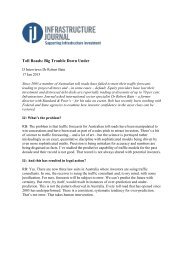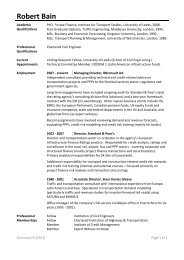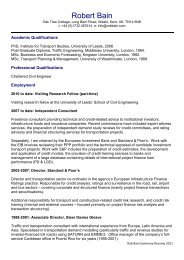Disincentivising overbidding for toll road concessions
Disincentivising overbidding for toll road concessions
Disincentivising overbidding for toll road concessions
- No tags were found...
Create successful ePaper yourself
Turn your PDF publications into a flip-book with our unique Google optimized e-Paper software.
4 │ INTERNATIONAL PRECEDENT FROM OTHER SECTORS<br />
41<br />
International precedent<br />
from other sectors<br />
In this section, the focus shifts away from the <strong>toll</strong> <strong>road</strong>s sector to other sectors that have faced similar issues.<br />
Section 4.1 introduces the approach of the UK DfT to introducing ‘competition <strong>for</strong> the market’ in passenger rail<br />
franchising. This provides important insight into best practice from an international comparator, but also highlights<br />
that issues surrounding <strong>overbidding</strong> are not confined to the <strong>toll</strong> <strong>road</strong>s sector.<br />
The UK 3G spectrum auction discussed in section 4.2 outlines the steps taken by the Radiocommunications Agency<br />
to achieve efficiency in the allocation of radio spectrum.<br />
Finally, the CAPEX menu <strong>for</strong>ecasting regime adopted by Ofwat, the regulator of the water sector in England and Wales,<br />
is presented in section 4.3. While not directly comparable in terms of the <strong>overbidding</strong> problem, this regime could<br />
represent an innovative solution to the problem of incentivising truthful revelation of <strong>for</strong>ecasts by corporations that<br />
stand to gain by ‘gaming’ the system.<br />
4.1 UK Department <strong>for</strong> Transport<br />
Passenger rail services in the UK have been delivered through franchising since the privatisation of British Rail’s<br />
passenger rail operations under the Railway Act 1993. The franchises are competitively procured and <strong>for</strong>m an<br />
agreement between the DfT and the privately owned train operating companies (TOCs). The DfT’s objective in<br />
awarding franchises to bidders is to provide passengers and taxpayers with a safe, reliable service and VfM.<br />
This section reviews the procurement process currently adopted by the DfT to draw out lessons <strong>for</strong> procurement<br />
best practice.<br />
4.1.1 The procurement process 106<br />
Pre-qualification<br />
Be<strong>for</strong>e issuing an invitation to tender (ITT), the DfT requires bidders to complete a pre-qualification questionnaire,<br />
which is used to narrow down all submissions into a small field of ‘high quality’ bidders. The DfT has noted that it<br />
believes the optimum number of bidders in the franchising process to be between three and five (since this balances<br />
the need <strong>for</strong> competition against keeping the costs of the bidding process low). 107 The companies that pre-qualify are<br />
those that score highest against two equally weighted criteria in their questionnaire responses:<br />
••<br />
demonstration of a ‘proven track record of service delivery and financial management in relevant areas of<br />
activity’, including an assessment of any past failure to deliver on contractual commitments;<br />
••<br />
demonstration of ‘appropriate outline plans and experience <strong>for</strong> the development and management of the<br />
Franchise’.<br />
Only those three to five companies that make it through the pre-qualification phase are issued with an ITT.<br />
106 Department <strong>for</strong> Transport (2011), ‘A guide to the railway franchise procurement process’, December.<br />
107 Ibid.<br />
47






